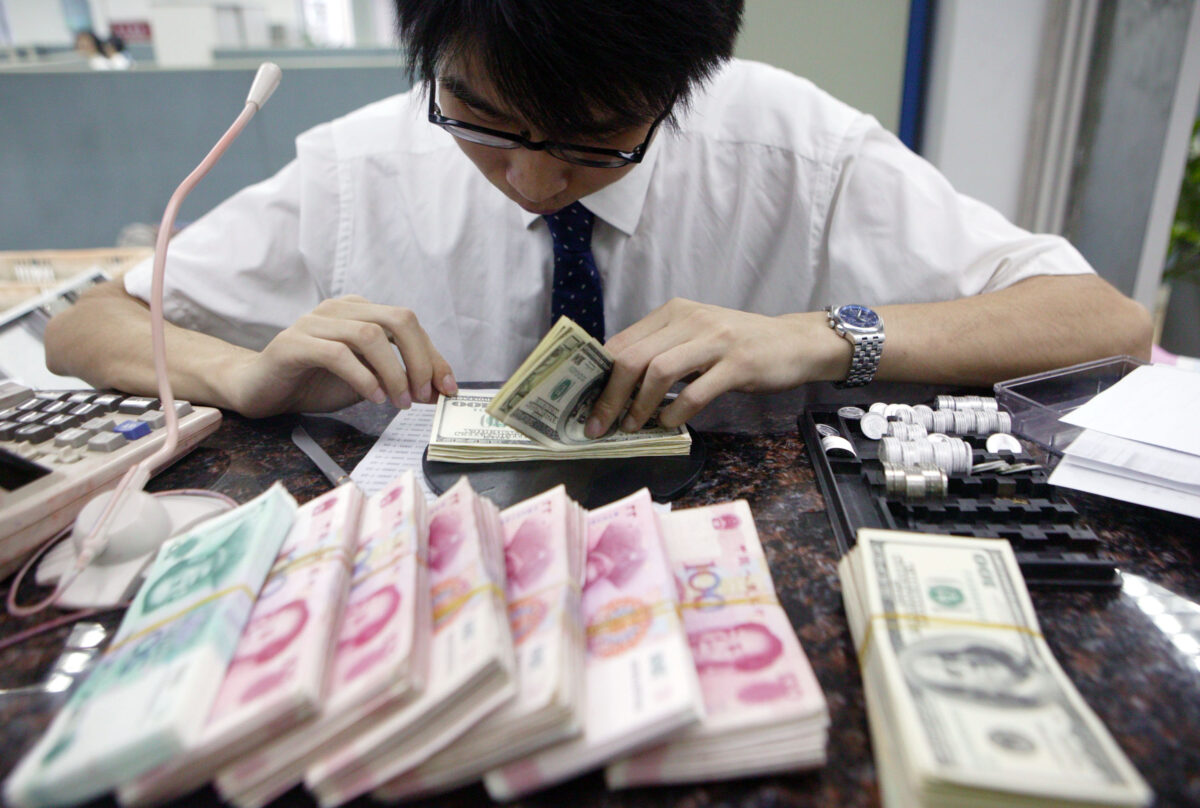The Chinese regime is planning to promote its newly-developed digital yuan at the upcoming Beijing Winter Olympics. Experts have warned the digital currency could threaten the hegemony of the U.S. dollar in the future.
The Winter Olympics is several weeks away. The Chinese regime’s official news agency Xinhua said earlier this month the digital yuan is ready to serve during the games: People can use it “either through wallet apps installed on their mobile phones or via physical wallets in the forms of cards and wearables such as smart watches and ski gloves or badges.”
But U.S. politicians have warned American athletes to keep away.
Congressman Lance Gooden (R-Texas), joined by Reps. Markwayne Mullin (R- Okla.), Lisa McClain (R-Mich.), and Jake Ellzey (R-Texas) sent a letter on Dec. 16 to the U.S. Olympic & Paralympic Committee, urging them to forbid American athletes from acquiring or using the new form of currency during the games. It “may be used to surveil Chinese citizens and those visiting China on an unprecedented scale, with the hopes that they will maintain digital yuan wallets on their smartphones and continue to use it upon return.” the letter read.
Digital yuan, or e-CNY, is a central bank digital currency (CBDC) issued and regulated by a country’s monetary authority.

Unlike cryptocurrency, another type of digital currency exemplified by bitcoin which is decentralized and able to evade supervision, CBDC is highly centralized and closely monitored by governments.
China’s CBDC is overseen by the People’s Bank of China (PBOC), its central bank. In contrast to U.S. financial institutions touting privacy protection, all China’s counterparts must “cooperate” with the party to submit clients’ personal information unconditionally if the authorities deem necessary.
A 2020 report by the Atlantic Council think tank said that, due to digital currency’s electronic footprints and PBOC’s monitoring of digital wallets activities, the Chinese regime can trace every movement of digital yuan as well as the identity of all transacting parties.
Having started commercial developments in 2017, China is now the frontrunner in advancing CBDC. Though the official launch date of the new yuan has not been announced, Beijing strongly desired to promote it at the February 2022 Winter Olympics as the prelude to its rollout.
Chinese Communist Party (CCP) officials have repeatedly stressed that the digital yuan will be primarily utilized in domestic retail payments, but some experts believe the regime has a plan to internationalize its new fiat money in hope that it can chip away dollar hegemony.
Abishur Prakash, a Canadian expert on geopolitics and technology, told VOA that since the rise of the five emerging economies, Brazil, Russia, India, China, and South Africa (BRICS) in 2009, there has been speculation that yuan would replace the dollar. But it did not happen. Now with digital yuan on the horizon, the current global monetary system dominated by the U.S. could be reshaped in the future, he said.
For its great convenience in use and real-time dealing with transactions and exchanges, CBDC has become an important topic in recent years. Dozens of countries including the United States are exploring the feasibility of introducing their own CBDCs. And China is leading the pack.
Some experts say that China may take advantage of the Belt and Road initiative to expand its digital currency electronic payment system. With digital yuan as a common currency, the trade costs among the nearly 70 participating countries and organizations would be lowered significantly, an arrangement that may prove too lucrative to resist.
Since World War II, the U.S. dollar has been the world’s largest reserve currency. As of 2020, 60 percent of foreign exchange reserves are denominated in dollars, while only 2.25 percent in yuan.
It seems that the Chinese regime has a long way to go to challenge the dollar, but the communist regime appears to be steadily marching toward its goal with little fanfare.

According to an October report by Financial Times, China was pressuring McDonald’s to use digital yuan wallets before the Olympics. About 270 McDonald’s restaurants in Shanghai had installed a system enabling consumers to pay with the e-currency, Beijing was urging the fast-food chain to expand its coverage throughout China.
Visa, the top sponsor of the Olympics, and Nike, the sponsor of the U.S. team, faced a similar situation, the report added.
The governor of China’s central bank Yi Gang recently reiterated that digital yuan is currently meant for domestic application, “while cross-border e-CNY transactions will require further discussion.” But Global Times, one of the CCP’s most influential mouthpieces, reported last month that southern China’s Hainan Province will promote testing and use of digital yuan in cross-border trade and financial services as part of its development plan for the Hainan Free Trade Port.
This marks the regime’s latest effort to globalize its digital currency. In January, the global cross-border payment system SWIFT set up a joint venture with PBOC’s digital currency research institute and clearing center, China’s Cross-border Interbank Payment System (CIPS), and the Payment & Clearing Association of China.
The business scope of the Beijing-based venture includes information system integration and data processing. According to some analysts, it was a clear sign that China was aggressively pushing the internationalization of digital yuan and trying to establish an alternative system to erode the dominance of the dollar.
Although SWIFT headquarters is in Belgium, it operates in the U.S. dollar global settlement system. Washington often uses the system as a tool to impose economic sanctions on states, including China and its allies.
The joint venture caught many experts by surprise. Prakash told VOA that it came amid the growing U.S.-China tensions when there was speculation that the United States might kick China or Hong Kong out of the SWIFT. China’s counter-attack “is aiming at the dollar, obviously, ” he said.
Analysts said that Beijing lured SWIFT with its huge market to help it increase the use of Chhina’s CIPS system. By this means, China not only could get rid of the dollar system itself, but also would help its allies such as Iran reduce their risk exposures to the U.S. system and thus gain its geopolitical clout.
After working with SWIFT, the regime’s next move would be to seek cooperation to connect digital yuan with the retail sector. One of the likely strategies, some observers said, could be making use of the WeChat Pay and Alipay cross-border payment platforms that landed the U.S. market years ago. The new endeavor needs partnerships with American companies, many of which would likely not say “no” in face of tremendous profits.
Former President Donald Trump signed an executive order on Jan. 5 to ban U.S. companies from transacting with WeChat Pay, Alipay, and 6 other China-developed apps, but the effort was reversed by the Biden administration.
Some critics said Washington should pay attention to the implications of China’s ambitious digital currency. “The government, Congress, and think tank communities need to investigate this topic and its broad impact today, not years after it emerges in a bigger problem,” Eric Sayers of the American Enterprise Institute told Financial Times.
The Group of Seven advanced economies tried to set up guidelines for CBDC at a meeting in the United Kingdom in October. Any digital currency issued by a central bank, the G7 finance leaders said in a statement, must meet rigorous standards of privacy, transparency, and accountability for protection of user data, “It should be grounded in long-standing public commitments to transparency, rule of law and sound economic governance,” they added.










